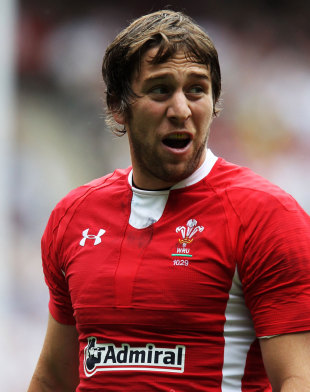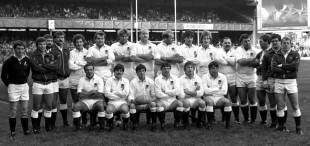|
Ask John
Longevity and inexperience
John Griffiths
November 21, 2012

Ryan Jones has captained Wales more times than any other
© Getty Images
Enlarge
Welcome to the latest edition of Ask John where renowned rugby historian John Griffiths will answer any rugby-related query you have! So, if there's something you've always wanted to know about the game we love but didn't know who to ask, or you think you can stump our expert - then get involved by sending us a question. In this edition, John looks at leading Welsh captains, brothers playing Tests for different countries, poor Grand Slam follow-ups, inexperienced England Test sides and New Zealand's senior surviving Test player. Who has captained Wales most often in Test matches? David Rees, England Ryan Jones has captained Wales most often in Tests, overtaking Ieuan Evans's record in the defeat by Samoa last Friday. Evans had held the record since the 1990s when he overtook the legendary Arthur Gould. The top ten Welsh captains of all time (to November 19 2012) are as follows:
29 - R P Jones (2008 to 2012)
Cornelius Dirksen recently won his first cap for the USA. His brother Hanno is gunning for a Wales call-up based on residency. How many other brothers have represented different national sides? Ian Williams, United States Cornelius Dirksen made his Test debut for the United States in the win against Russia at Colwyn Bay earlier this month. He also played against Tonga last weekend. As you say, his brother could play for Wales by qualifying on residency. Their uncle was Corra Dirksen who played on the wing for South Africa in ten Tests in the 1960s. The following is a list of brothers who have played Tests for different countries. (This list is restricted to brothers where at least one of them played for a leading nation):
Astons for England & South Africa
Alatinis for New Zealand & Tonga
(Readers are invited to add to this list) Has any country had such a poor international run as Wales after winning the Grand Slam? Ben Davies, Wales Although Wales beat the Barbarians in a cap match after taking the Grand Slam earlier this year, they have lost five successive internationals with New Zealand and Australia next up. All told, there have been 37 Five/Six Nations Grand Slams since France began playing Test rugby in the first decade of the Twentieth Century. The only side to win a Grand Slam and then experience a run of more than five international defeats is Scotland. After winning the 1984 Grand Slam they lost six on the trot: to Romania (barely a couple of months later) and then Australia, Ireland, France, Wales and England as they followed the Slam with a Whitewash in the 1985 Five Nations. After years of striving France didn't win their first Grand Slam until 1968. Like Wales (against the Barbarians) they then played a meaningless capped Test (beating Czechoslovakia 19-6 in Prague) as a warm-up for a summer tour to New Zealand and Australia. That Grand Slam side then lost ten in a row - three Tests in NZ, a one-off Test in Australia, two Tests in France against SA and a Test against Romania in Bucharest at the end of the year before losing their first three Five Nations games of 1969 - against Scotland, Ireland and England. Eventually they squeezed a draw against Wales in Paris in the final game of the 1969 Championship. How inexperienced was Stuart Lancaster's side against Fiji compared to England sides of the recent past? LB, England

The England team that played Australia in 1984
© PA Photos
Enlarge
Measuring experience by cap total before taking the field (so that the 1871 side against Scotland had a total of zero), England's team against Fiji was the least experienced for ten years. The run-on fifteen against Fiji had a total of 215 caps among their ranks before kick-off. That figure was 18 fewer than the run-on total for Lancaster's first Test in charge of England, against Scotland at Murrayfield earlier this year. Sir Clive Woodward called on 170 caps-worth of experience for his first game in charge when England drew with Australia at Twickenham in November 1997 and the lowest England total in the professional era was the 104 for the one-off Test against Argentina in Buenos Aires in 2002 when Geoff Appleford, Phil Christophers and Alex Codling were among the new caps. Towards the end of Clive Woodward's time he was able to name a run-on fifteen that had amassed more than 600 caps for the 2003 RWC Final in Sydney against Australia. When Martin Johnson, Lancaster's predecessor, took charge for his last match, the RWC quarter-final defeat against France in Auckland in October 2011, there were 587 caps among the run-on side. The lowest cap total of the last thirty years was 62 when Nigel Melville captained England (on his debut) against Andrew Slack's Wallabies at Twickenham in 1984. Among the England new boys that day were Stuart Barnes, Gareth Chilcott, Nigel Redman and Rob Lozowski. John Carleton (25 caps) and Gary Pearce (15) were the only members of that side who took the field with ten or more caps to their names. They lost 19-3 to a Grand Slam side that included youngsters Michael Lynagh and Nick Farr-Jones. Who has succeeded the late Bob Scott as New Zealand's oldest surviving Test player? Denis O'Brien, Ireland Bob Scott passed away at his Coromandel home on November 16 at the age of 91. He is succeeded by Wally Argus as the oldest surviving New Zealand Test player. Argus, also 91, is three months younger than Bob Scott. Scott, Argus and Fred Allen (who died earlier this year at the age of 92) were among the 15 new caps in New Zealand's first post-war Test team, against Australia at Dunedin in September 1946. The three of them had been star performers with the "Kiwis" - the New Zealand Forces rugby team later dubbed the "Khaki All Blacks" - that toured Europe in the first winter after World War Two. © ESPN Sports Media Ltd.
|
Live Sports
Communication error please reload the page.
-
Football
-
Cricket
-
Rugby
-
- Days
- Hrs
- Mins
- Secs
F1 - Abu Dhabi GP
Abu Dhabi Grand Prix December 11-131. Max Verstappen ()
2. Valtteri Bottas (Mercedes)
3. Lewis Hamilton (Mercedes)
4. Alexander Albon ()
5. Lando Norris ()
6. Carlos Sainz Jr ()
-
ESPNOtherLive >>
Darts - Premier League
Golf - Houston Open
Snooker - China Open
Tennis - Miami Open

